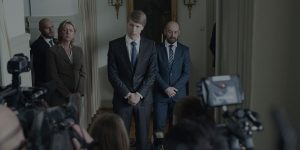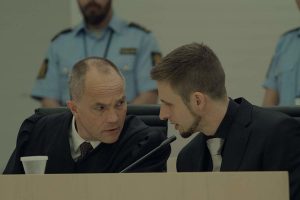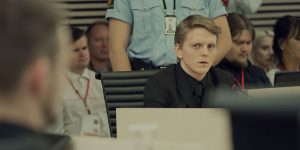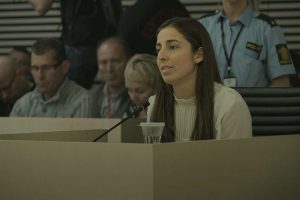This movie is currently available for viewing on Netflix.
![]() Over the years, writer/director Paul Greengrass has made many a film based around real life incidents, including Bloody Sunday, United 93 and Captain Phillips. His latest is 22 July, a dramatization of the horrific 2011 Norway attacks that left 77 dead. While the subject matter is very recent and distressing, this exceptional feature finds a way to tell the story successfully, ultimately focusing on the aftermath. Among the filmmaker’s many effective projects that are based on true events, this is his best one yet.
Over the years, writer/director Paul Greengrass has made many a film based around real life incidents, including Bloody Sunday, United 93 and Captain Phillips. His latest is 22 July, a dramatization of the horrific 2011 Norway attacks that left 77 dead. While the subject matter is very recent and distressing, this exceptional feature finds a way to tell the story successfully, ultimately focusing on the aftermath. Among the filmmaker’s many effective projects that are based on true events, this is his best one yet.
 That one sentence summary written above may be oversimplifying the movie, which deals with a great number of the persons involved. It shows the preparations of far-right, ultranationalist Anders Behring Breivik (Anders Danielsen Lie), as well as his bombing attack on government offices in Oslo. The movie also deals with the harrowing events at Utøya, where teenagers at a youth league summer camp (which was funded in part by the administration) were targeted and shot by the very same assailant.
That one sentence summary written above may be oversimplifying the movie, which deals with a great number of the persons involved. It shows the preparations of far-right, ultranationalist Anders Behring Breivik (Anders Danielsen Lie), as well as his bombing attack on government offices in Oslo. The movie also deals with the harrowing events at Utøya, where teenagers at a youth league summer camp (which was funded in part by the administration) were targeted and shot by the very same assailant.
 However, most of the feature deals with what happened afterwards. Viewers follow the insanity case prepared by defense attorney Geir Lippestad (Jon Øigarden) after hearing Breivik’s rationalization for his actions (which involves hateful anti-immigration and anti-multiculturalism sentiment, describing his attacks on members of the Labour Party and youth league as a necessary step to preserve his cultural heritage). However, it is Viljar (Jonas Strand Gravli) who receives the most attention as a shooting victim and survivor. Latter sections detail his grief and trauma, as well as the stress of deciding whether or not to make a statement in front of his attacker.
However, most of the feature deals with what happened afterwards. Viewers follow the insanity case prepared by defense attorney Geir Lippestad (Jon Øigarden) after hearing Breivik’s rationalization for his actions (which involves hateful anti-immigration and anti-multiculturalism sentiment, describing his attacks on members of the Labour Party and youth league as a necessary step to preserve his cultural heritage). However, it is Viljar (Jonas Strand Gravli) who receives the most attention as a shooting victim and survivor. Latter sections detail his grief and trauma, as well as the stress of deciding whether or not to make a statement in front of his attacker.
 There are about 100 ways in which this production could have gone wrong, but everything about the film is note perfect. On a technical lever, the photography contrasts some beautiful locations with a cool palate and uses hand-held framing, underpinning and emphasizing unease and tension during the first thirty minutes. These early scenes are incredibly unnerving and difficult to watch (as they should be).
There are about 100 ways in which this production could have gone wrong, but everything about the film is note perfect. On a technical lever, the photography contrasts some beautiful locations with a cool palate and uses hand-held framing, underpinning and emphasizing unease and tension during the first thirty minutes. These early scenes are incredibly unnerving and difficult to watch (as they should be).
The movie wisely takes a low-key and understated approach to the overall story, with the excellent performers lending further authenticity to the proceedings. It never resorts to sentiment or sensationalism, simply recreating the story as realistically as possible and following how the various parties process the events and ultimately come together to deal with tragedy.
 The discussions that follow are equally moving as Viljar begins opening up to another youth named Lara Rashid (Seda Witt) who also endured the Utøya shooting. There are subtle comments placed throughout, including a line in which the naturalized refugee Lara states that she doesn’t understand how anyone could possibly be afraid of either her or her family. It’s an astute, unpretentious little moment. The movie presents this and other conversations with lines that resonate. Frankly, I can’t find any way in which this tale could have been handled more sensitively or with more skill.
The discussions that follow are equally moving as Viljar begins opening up to another youth named Lara Rashid (Seda Witt) who also endured the Utøya shooting. There are subtle comments placed throughout, including a line in which the naturalized refugee Lara states that she doesn’t understand how anyone could possibly be afraid of either her or her family. It’s an astute, unpretentious little moment. The movie presents this and other conversations with lines that resonate. Frankly, I can’t find any way in which this tale could have been handled more sensitively or with more skill.
Admittedly, this is a long movie, running at close to two and a half hours, but it’s also paced remarkably well. There aren’t any slow spots and each development leads to a new complication or realization right up until the finale. Director Greengrass never hammers viewers over the head with the message, but as mentioned previously, the point is abundantly clear and effectively delivered.
Some may question why a movie like this needs to be made this soon after such a horrific tragedy, but many of the demented ideas detailed by the attacker haven’t gone away in the passing years… in some ways, they have only spread further. 22 July is an excellent, important movie and one that, much like one of its teenage protagonists, feels compelled to stand up and speak out against intolerance and extremism.


